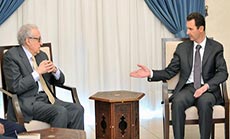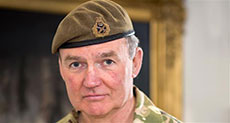Two Tears on Revolution, Deadly Protests Roil Egypt

Local Editor
Two years ago, the days of revolution were fruitful. Egyptians flooded into streets and squares. Martyrs felt and the Pharaoh was toppled: Hosni Mubarak is out of the game. Today, Thousands of Egyptian protested in the same streets and squares demanding the ouster of newly elected President Mohammad Mursi.
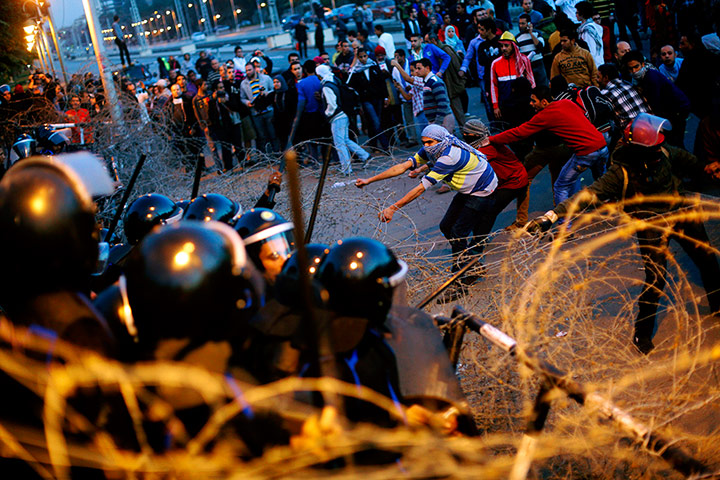 According to media outlets, at least seven people were killed, six of them in Suez where gunfire erupted during clashes between anti-government protesters and those loyal to President Mohamed Mursi,.
According to media outlets, at least seven people were killed, six of them in Suez where gunfire erupted during clashes between anti-government protesters and those loyal to President Mohamed Mursi,.
Four of those killed in Suez had been shot in the abdomen, Health Ministry spokesman Ahmed Omar told state-run EGYNews.
It was not clear which group those killed belonged to or who was responsible. The head of security in Suez denied his forces fired on protesters, state TV reported. By Saturday morning, Egyptian armored vehicles were dispersed around Suez at the request of the city's security chief, who had said his forces were fired upon and feared the situation was getting out of control, EGYNews reported.
Yet the unrest was not confined to the coastal city of Suez, on the northern tip of the Red Sea.
The seventh death was in Ismailia, according to EGYNews. Nationwide, at least 456 people -including dozens of police and security forces, though the vast majority were civilians -were injured throughout the day, health ministry officials said.
Into Saturday morning, after the anniversary of what some call the January 25 Revolution officially had passed, thousands of protesters were still in a standoff with police outside state-run Nile TV's offices in Cairo. Some demonstrators there tossed Molotov cocktails, while police responded with tear gas.
Mursi, who became the North African country's first democratically elected president last year, has since become a target for some who say he hasn't been inclusive or true to the revolution's goals. Those critics say he has amassed power for himself and his allies. Mursi was a leader in the Muslim Brotherhood, before he rose to power. He has defended his moves as necessary to move Egypt forward in the face of pressing issues and persistent obstacles.
On Friday, state TV reported security forces had thwarted attempts to raid security headquarters in Faiyum, a city about 100 kilometers (62 miles) south of Cairo. Other security forces turned back pushes on government buildings in Damietta, Kafr el-Sheikh and Gharbia, as well as Suez.
In Ismailia, a city between Suez and Port Fouad in northeastern Egypt, protesters torched the main office of the Freedom and Justice Party - the Muslim Brotherhood's political wing.
The violence prompted Mursi to issue statements on his official Twitter account, in which he offered his condolences for those killed and pledged his support for all Egyptians' right to protest peacefully. At the same time, the president said the government won't hesitate to prosecute those responsible for violence "and bring them to justice."
"I call on all citizens to uphold the noble principles of the Egyptian revolution to express their opinion freely and peacefully, renounce violence in word and deed," he said.
There also were protests in Cairo's Tahrir Square, the hub of the popular movement that began its push on January 25, 2011, to unseat Mubarak.
Back then, protesters spilled into the streets around that major intersection in an unprecedented display of anti-government rage.
At one point, the activist masses in the world's largest Arab nation broke through riot police who had lined Tahrir, or Liberation, Square. Police lobbed tear gas and used water cannon, but the protesters were undaunted.
Since then, the square has continued to be a focal point for demonstrations for Egyptians from all factions.
That was true again Friday, and by afternoon at least 10,000 liberals, moderates and secularists had gathered there to vent their anger at Mursi and the Muslim Brotherhood for- in their view - hijacking the revolution.
One pocket of violence broke out a few blocks from the square, where police erected a barrier of concrete blocks on a street leading to the Interior Ministry and other government buildings.
Young protesters threw rocks over the barrier at officers stationed there, who responded sporadically with tear gas or threw stones themselves.
At least 29 people were treated for cuts, broken bones and birdshot injuries, Health Ministry spokesman Khaled al-Khatib said. Six police officers were also hurt in the disorder near Tahrir Square, according to the Interior Ministry.
Source: News Agencies, Edited by moqawama.org
Comments
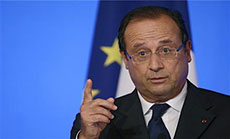
France’s Hollande in Qatar for Warplane Deal
9 years ago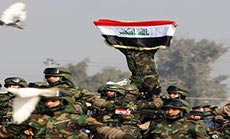
Iraq Police Dismantles Al-Qaeda Protest Site
10 years ago